The Cornell University “Alliance for Science” needs to rename itself the Alliance for Dishonest Propaganda after telling falsehoods about climate change, crops, and Southern Africa. Appearing among the top results this morning in Google News search results for “climate change,” an Alliance for Dishonest Propaganda article claims climate change is devastating crop production in Southern Africa. The exact opposite is the case, clearly and objectively shown by Southern Africa crop data.
The Alliance for Dishonest Propaganda article is titled, “African farmers yearn for biotechnology in the face of climate change.” The article’s opening sentence reads, “Southern Africa is on the receiving end of the devastating impact of climate change, driving millions into hunger.”
“The magnitude of the problem in this part of the world has reached unprecedented levels, creating a threat to peace, security and stability. At the center of this catastrophe are the small-scale farmers,” the article continues.
Climate alarmists love to make up seemingly factual claims out of thin air, while producing no data or evidence to back them up. In this case, not surprisingly, the Alliance for Dishonest Propaganda article cites no objective data to support its claim that climate change is “driving millions [of Southern Africans] into hunger.”
Fortunately for science, and unfortunately for the Alliance for Dishonest Propaganda, the United Nations Food and Agriculture Organization (FAO) keeps detailed records of crop production, including crop yields by year and by nation.
Let’s take a look at the objective crop data reported by the United Nations.
Here is the FAO crop data for South Africa. The chart shows yields per acre for the important Big Three cereal crops of corn, wheat, and rice. As you can see, crop production is enjoying spectacular growth as the Earth modestly warms, with the past 10 years providing the 10 highest crop yields in South African history.
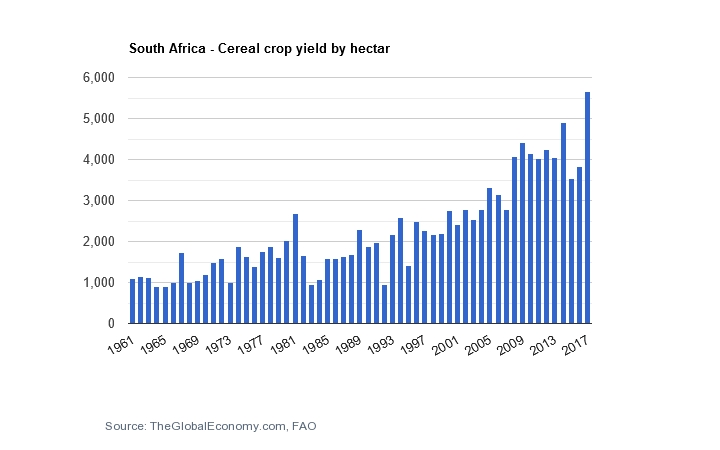
The Alliance for Dishonest Propaganda article also focuses a great deal of attention on farmers in Zambia. Here is the FAO crop data for Zambia. Like South Africa, Zambia is enjoying substantial, consistent long-term growth in its crop yields. The past eight years provided eight of the nine highest crop yields in Zambian history.
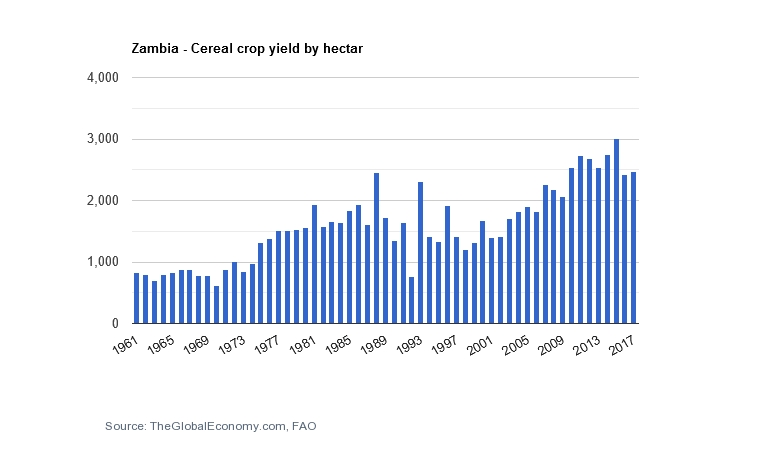
Here is the FAO crop data for Botswana. Botswana is a rare outlier in that the country is not enjoying a substantial long-term increase in crop yields. On the other hand, Botswana is not suffering declines in crop yields, either. Crop yields in Botswana are showing no long-term trend for the better or worse. Steady yields, however, falsify the Alliance for Dishonest Propaganda’s claim that climate change is devastating crop yields at “unprecedented levels” and driving millions into hunger.
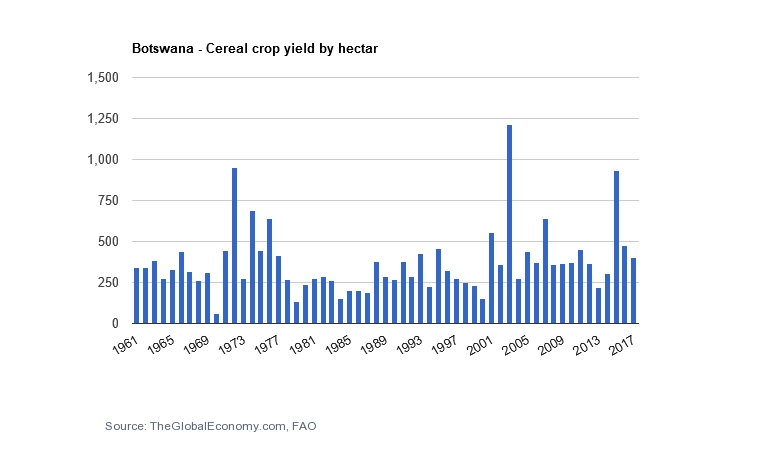
And it’s not just Southern African crop yields benefiting from climate change. Let’s assume a hypothetical in which Southern African crop yields were dramatically declining as the Alliance for Dishonest Propaganda falsely claims. To tie such an occurrence to global warming or global climate change would require showing that global crop yields are also falling. After all, if global crop yields are holding steady or increasing, then it is difficult to argue that global warming would be to blame for declining Southern African crop yields. And even if Southern African crop yields were declining while global crop production is holding steady or rising, it would be a lie by omission not to mention this fact when discussing hypothetically declining Southern African crop yields.
With that in mind, here is the latest FAO graph on global crop yields. As you can see, global crop production, like crop production in Southern Africa, is steadily rising in our warming world and setting new records virtually every year.
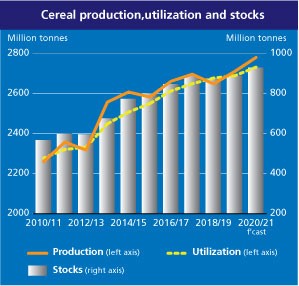
If they wish, climate propagandists can make highly dubious predictions of declining future crop yields. Such predictions would defy every trend that is occurring and every piece of real-world evidence while the world modest warms. Those predictions would be highly unlikely, but at least not demonstrably false right now. To the contrary, when the Cornell “Alliance for Science” makes a straightforward claim that climate change is currently driving millions of Southern Africans into hunger via unprecedented crop failures, that is simply a lie.
Cornell Alliance for Science, your new and more appropriate name is the Cornell Alliance for Dishonest Propaganda. Wear your new name with pride, for you have earned it.















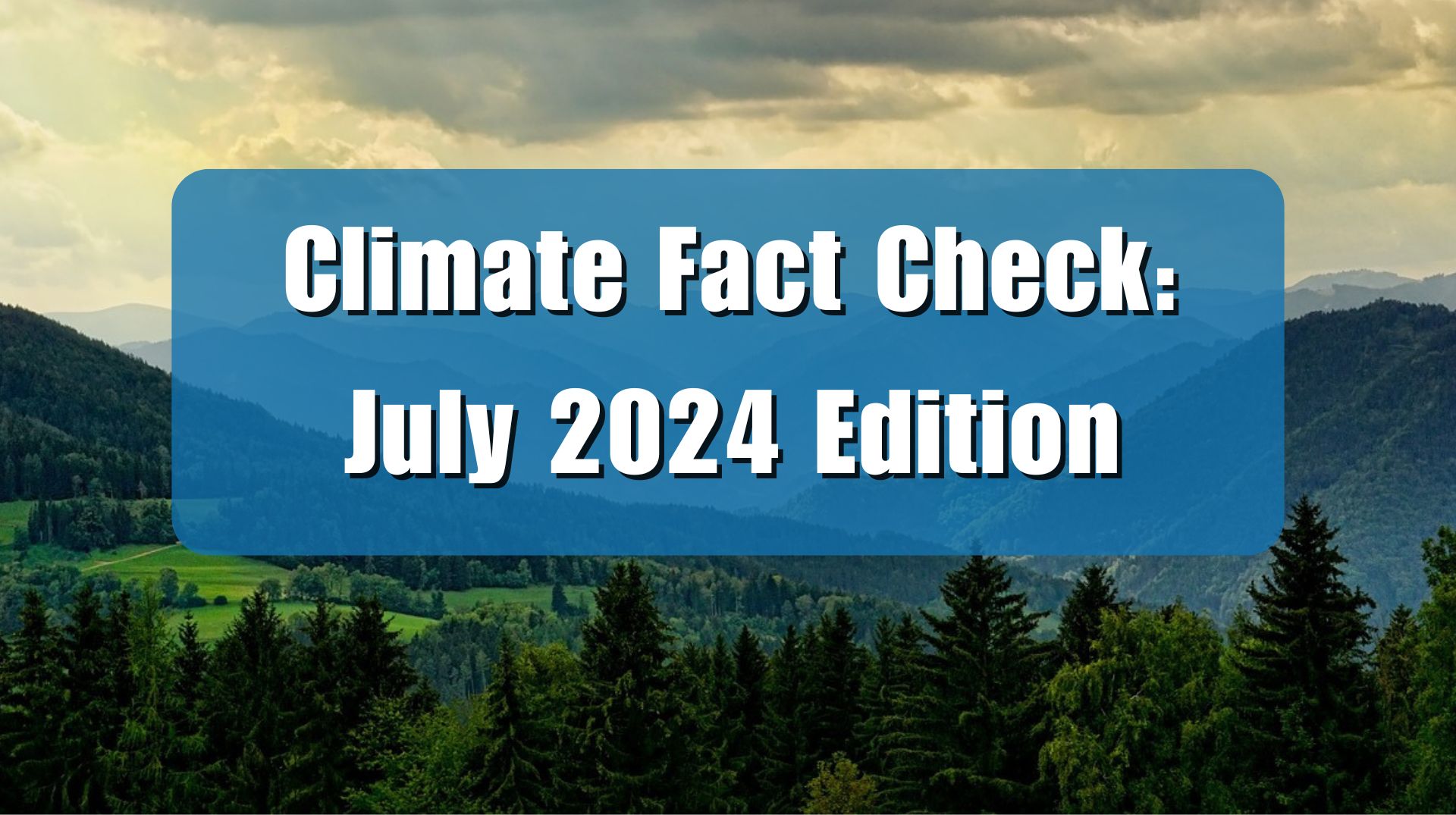

The article keeps referring to the benefits from a slightly warming world. I believe that the warming is a very minor part of the higher crop yields. The big factor is the increase in the atmospheric CO2 content. For most crop plants the optimal CO2 level is between 750 and 1000 ppm, so we have a ways to go to optimum. At the end of the last glacial maximum we were at 170 to 180 ppm; below 150 ppm terrestrial plant life starts dying off.
NASA has some studies addressing the importance of the CO2 fertilization effect.
[…] Change Weekly 362; Climate Realism; Climate Realism; CO2 Science; Nongovernmental International Panel on Climate Change; Climate […]
[…] Climate Change Weekly 362; Climate Realism; Climate Realism; CO2 Science; Nongovernmental International Panel on Climate Change; Climate […]
[…] production that the Alliance claimed was “driving millions [of Africans] into hunger.” Yet data from the UN Food and Agriculture Organization shows cereal (staple) food crop production across southern Africa has grown substantially, and […]
[…] production that the Alliance claimed was “driving millions [of Africans] into hunger.” Yet data from the U.N. Food and Agriculture Organization shows cereal (staple) food crop production across southern Africa has grown substantially, and […]
[…] production that the Alliance claimed was “driving millions [of Africans] into hunger.” Yet data from the U.N. Food and Agriculture Organization shows cereal (staple) food crop production across southern Africa has grown substantially, and […]
[…] production that the Alliance claimed was “driving millions [of Africans] into hunger.” Yet data from the U.N. Food and Agriculture Organization shows cereal (staple) food crop production across southern Africa has grown substantially, and […]
[…] in crop production that the Alliance claimed was “driving millions [of Africans] into hunger.” Yet data from the U.N. Food and Agriculture Organization shows cereal (staple) food crop production across southern Africa has grown substantially, and […]
[…] that the Alliance claimed was “driving millions [of Africans] into hunger.” Yet data from the U.N. Food and Agriculture Organization shows cereal (staple) food crop production across southern Africa has grown substantially, and […]
[…] Alliance claimed used to be “riding thousands and thousands [of Africans] into starvation.” But knowledge from the U.N. Meals and Agriculture Group displays cereal (staple) meals crop manufacturing throughout southern Africa has grown […]